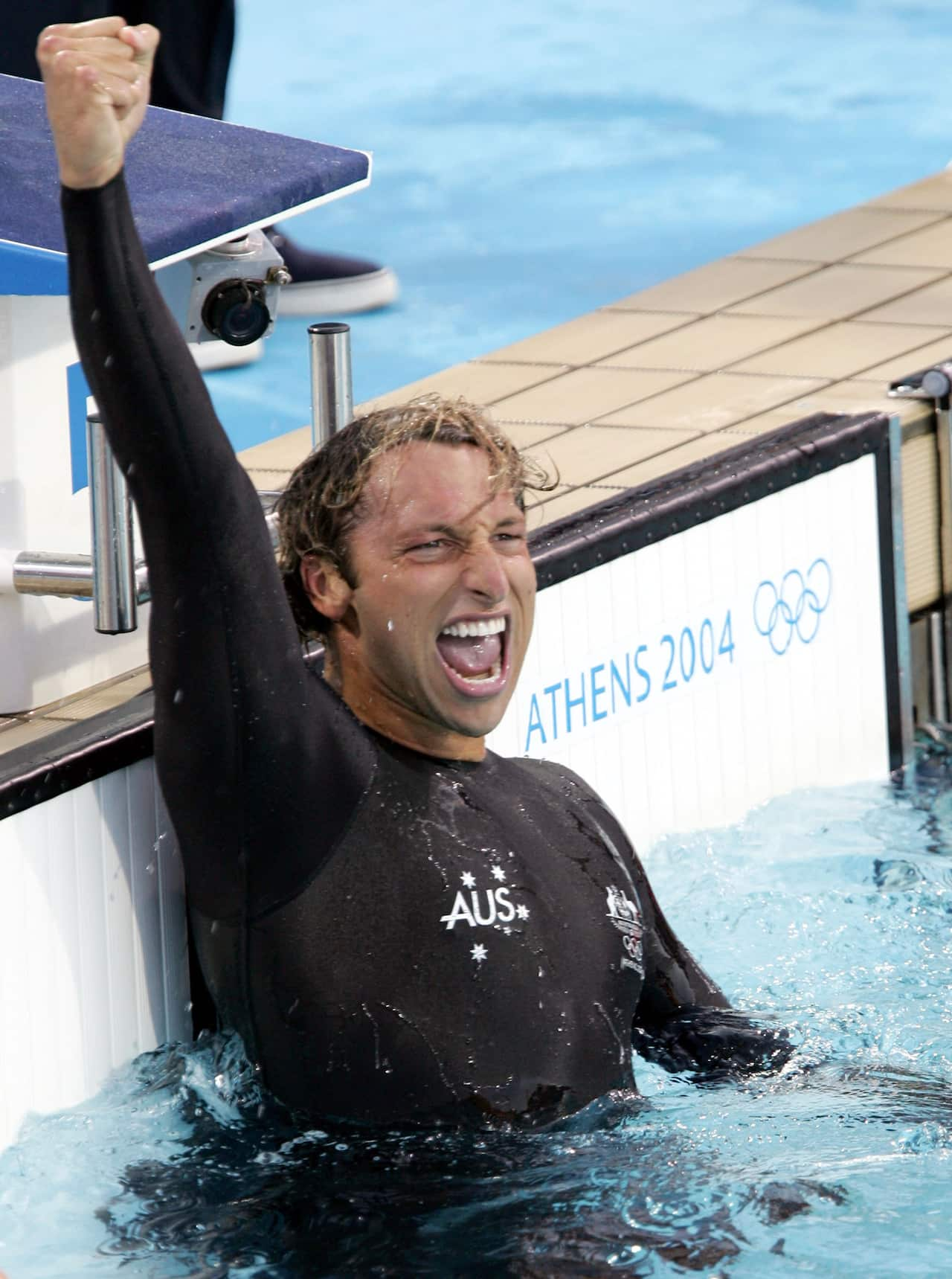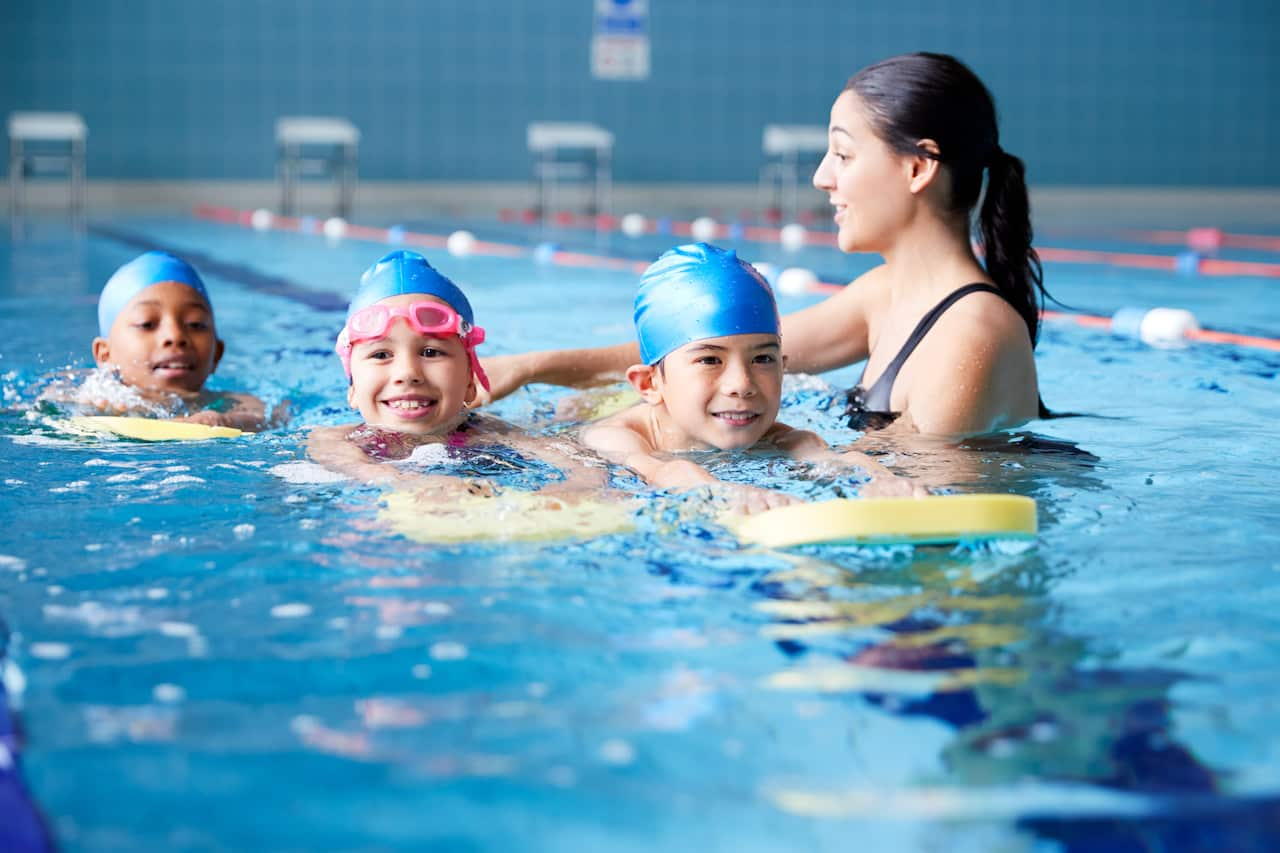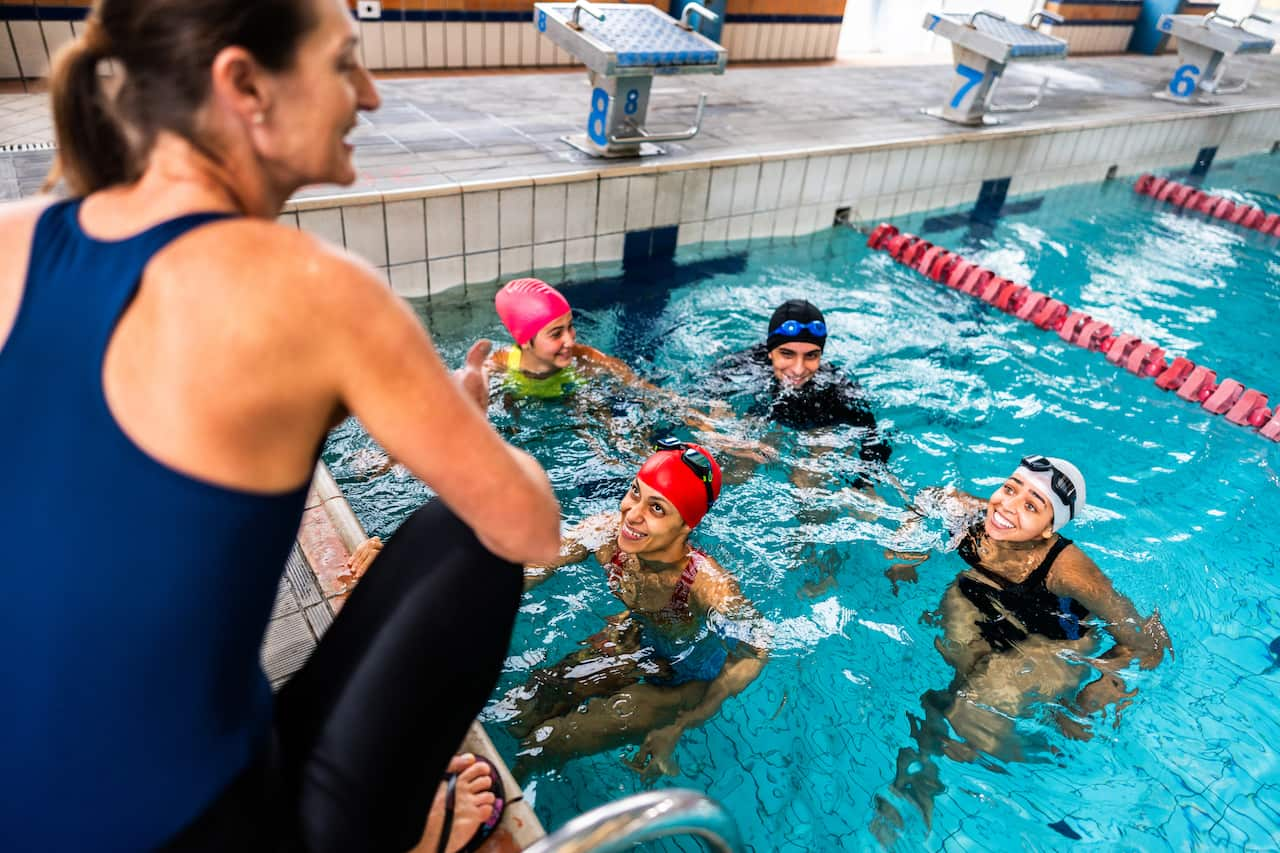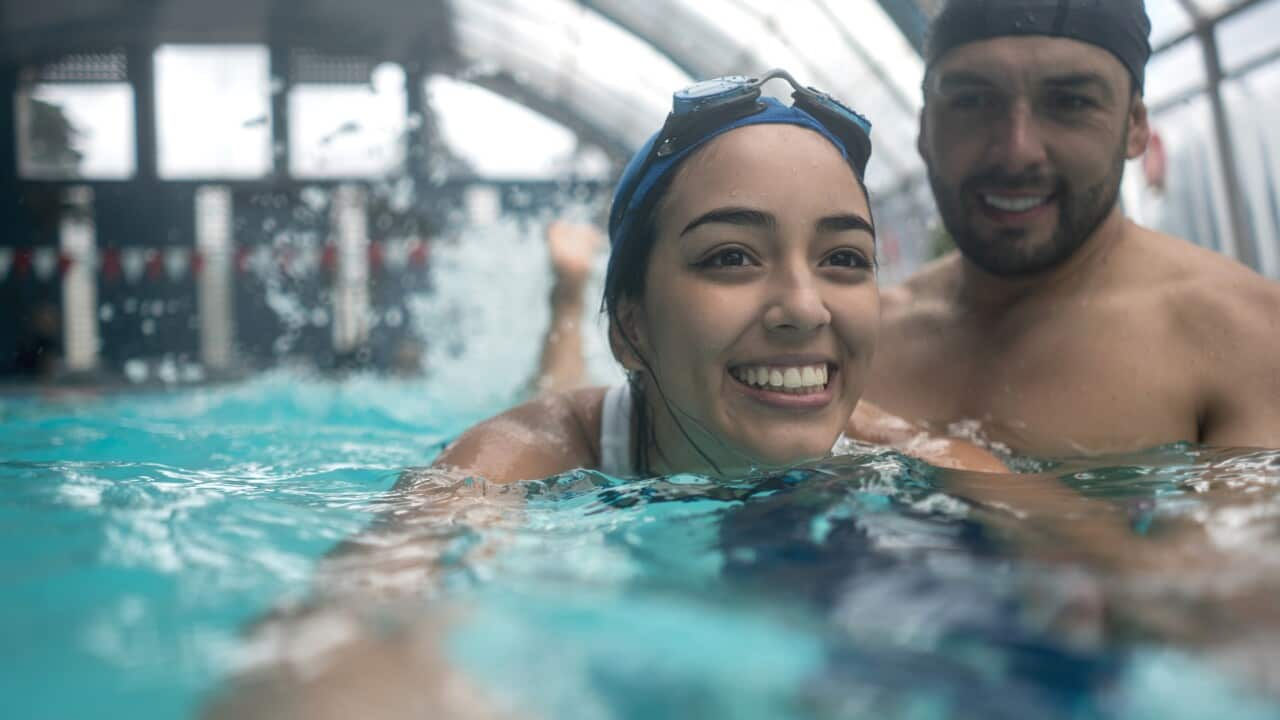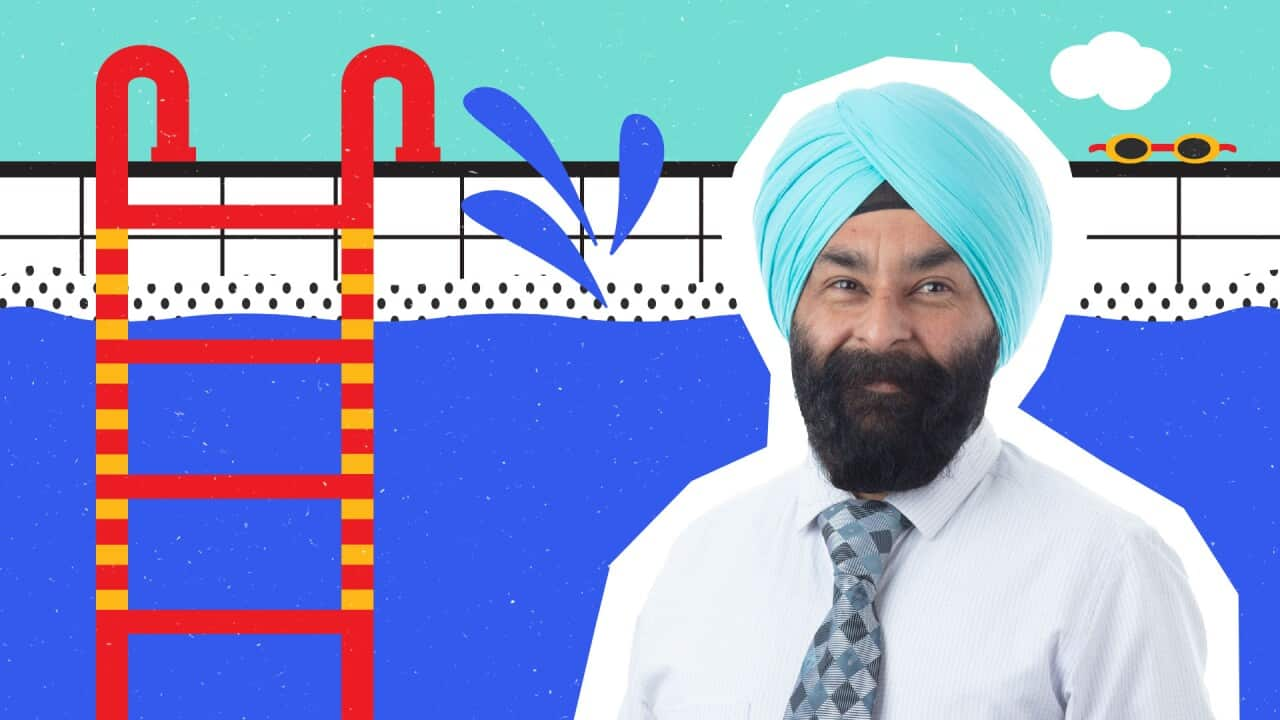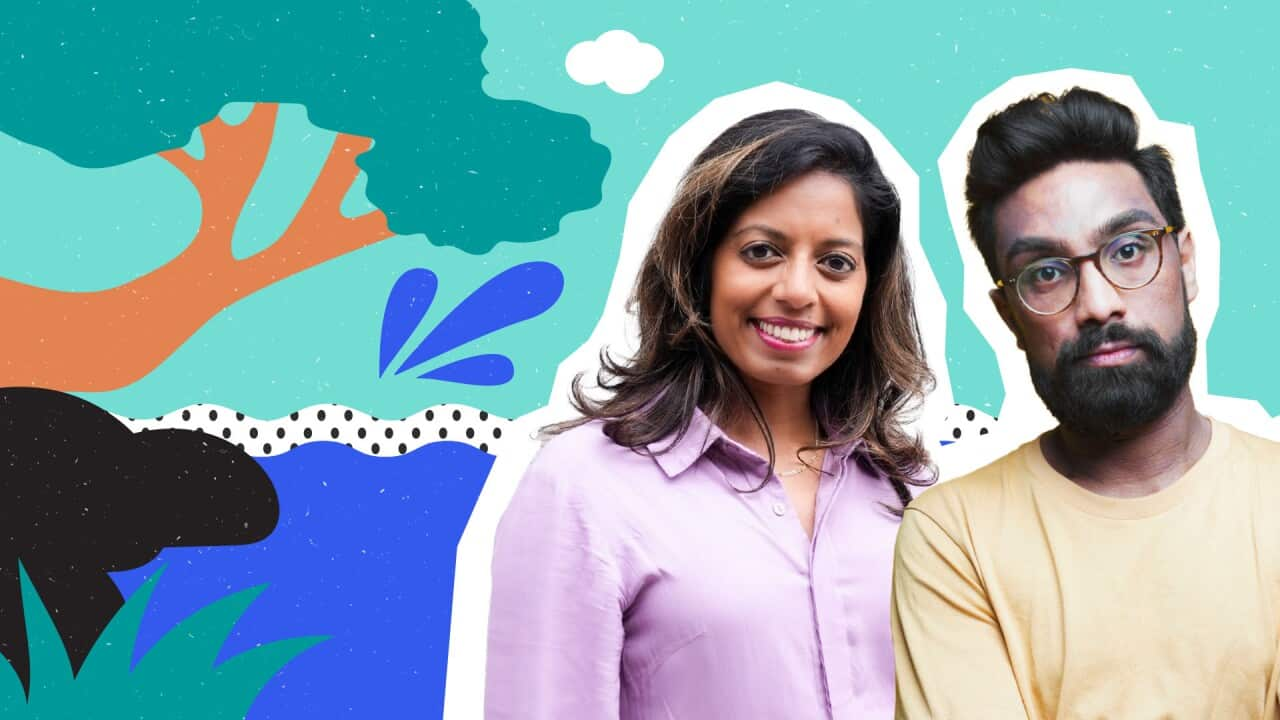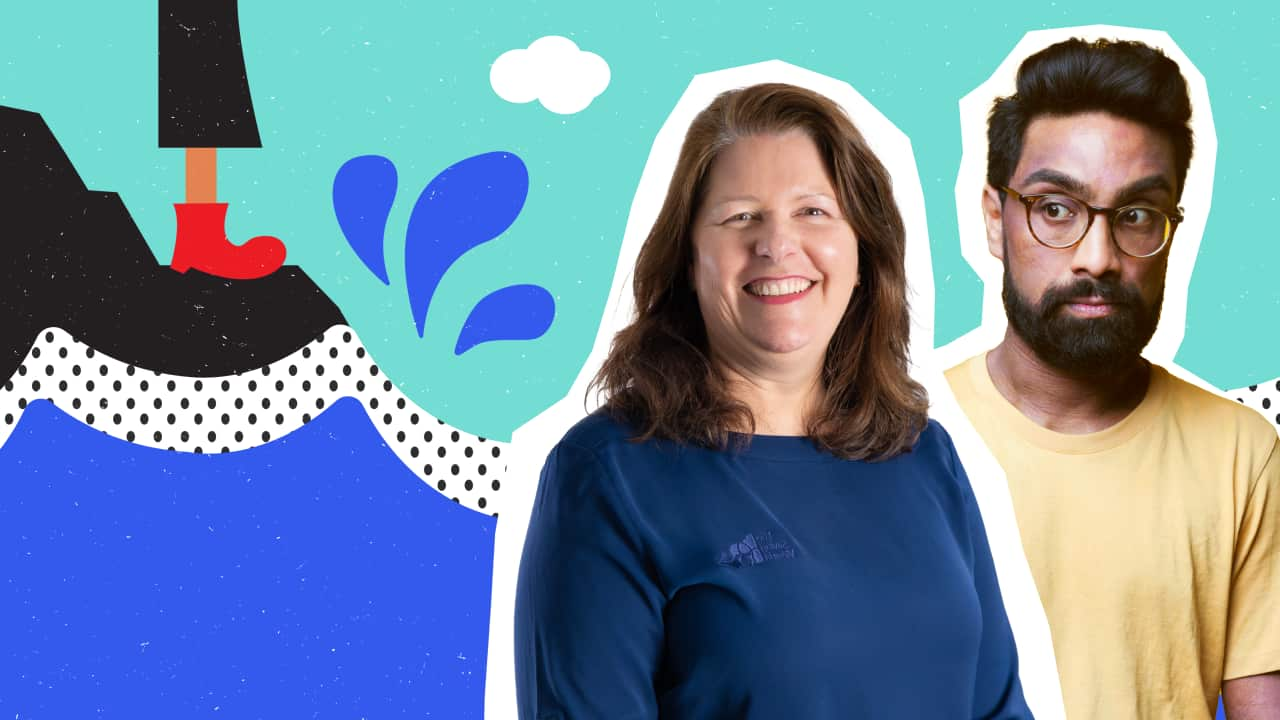Sashi Perera
We'd like to acknowledge the Traditional Owners of the Land we're recording from. We pay our respects to the Wurundjeri Woi Wurrung people of the Kulin nation and their elders past and present. We also acknowledge the Traditional Owners from all Aboriginal and Torres Strait Islander lands you're listening from.
Ian Thorpe
I, uh, growing up, did not very much take to water. I remember even having a bath was a bit of an ordeal, when I was very young. Couldn't really articulate why, it just was a discomfort around bodies of water.
Ian Thorpe
As far as I can tell there was no incident that inspired it. Although, I was raised Catholic, so maybe something happened at the baptism.
Ian Thorpe
And then when it came to swimming lessons, I just never felt comfortable in the water. I was asthmatic and just a bit of a timid boy, and the first few lessons when they gave us kickboards, I thought I was, I knew what I was doing. But then, as soon as they took the kickboard away, boy did I feel uncomfortable, and I didn't stray far from the shallow end ever.
Ian Thorpe
When I was in school and swimming was like a part of the physical education curriculum. I would deliberately like forget to bring swimming trunks, or I would get my mum to write a note. I just didn't feel comfortable in the water. But then, on top of that, everything, then that was the the lens through which I saw everything. So, I hated the change rooms, I always felt they were disgusting. I hated like putting my feet on the, the wet floor in the change rooms.
Ian Thorpe
Also just body positivity stuff I guess, I was uncomfortable, like getting changed in the changing rooms. Yeah, it just felt, everything felt disgusting about it.
Suren Jayemanne
I'm Suren Jayemanne. I'm a second generation Sri Lankan Australian and I'm a comedian, writer and actor who's been putting off learning to swim for way too long. And I'm starting to get the feeling if I really want to enjoy this beautiful country and make the most of it, I should start learning sooner rather than later.
Sashi Perera
I'm Sashi Perera. I'm also a second generation Sri Lankan Australian. I'm also a comedian and a writer, but I love to swim. I'm very enthusiastic about it, but I'm also here to learn, and I reckon you should come along with us.
Suren Jayemanne
Welcome to Head Above Water, an SBS podcast exploring water culture and beach safety in Australia. Are you familiar with tinnies? That's the Australian word for a little boat. Maybe you're not, maybe you don't know how to stay safe on one, or maybe you think a rip is just something that happens when your pants are too tight?
Sashi Perera
In this episode, you'll learn about local swimming pools and the kinds of programs you might want to look into if you're learning to swim for the first time, or if your kids are. So, put on your bathers, grab a kickboard and your goggles because together we're splashing out.
Suren Jayemanne
Wait, you said bathers?
Sashi Perera
Do not get me started on the number of different Australian words for swimwear.
Suren Jayemanne
Cos I'm pretty sure I bought togs.
Sashi Perera
Suren, I understand that it can be daunting, getting comfortable around the water as an adult, so I have someone for you to meet. He is a leader of his Sikh community, an academic at the Federation University, but also most importantly is that when he first came to Australia, he couldn't swim. As a child, he nearly drowned in India's River Ganges and it scared him off the water for years to come.
Sashi Perera
But once he learnt how common drowning is for migrants in Australia, he decided he wanted to do something about it and decided there had to be a change.
Dr Harpreet Singh Kandra
I was very young and I was at a Gurdwara in India, and there's an unsaid practice where, you know, we are told to take a dip in the holy Sarovar before we get to the Gurdwara.
Sashi Perera
This is Dr Harpreet Singh Kandra, a Sikh community leader and academic at Federation University.
Dr Harpreet Singh Kandra
I got into this Sarovar, spent a few minutes, and then, you know, because of some algae there, I just, you know, tripped and slipped and I was drowning.
Dr Harpreet Singh Kandra
My mother, who was sitting about 50 60 metres away, jumped into the Sarovar to get me out, and she did not know swimming, so she was also drowning.
Dr Harpreet Singh Kandra
All of a sudden, someone from somewhere came and they pulled both of us out and disappeared. So that was, that was a shocking incident in my early childhood, which, you know, really, really affected me.
Suren Jayemanne
Do you remember what that feeling was like when you were under the water that day?
Dr Harpreet Singh Kandra
I know, you know, I was quite young then and I, I was shocked. Every time my parents would tell the story to my relatives, my family members, my neighbors. I mean, the same incident would come into my head every now and then. And now, when I'm talking to you, I'm again, you know, kind of shivering with that incident. So that's the kind of phobia that can be created out of, you know, any accident that you go through in your life, especially when you're very young, and your mind is, you know, still processing things, learning things.
Sashi Perera
When you moved to Australia, were you worried about being totally surrounded by water?
Dr Harpreet Singh Kandra
See, ever, every time I go to a holiday and, and in Australia where you have, I mean, thousands of beaches, um, I think my holiday is incomplete because I'm scared to get into the water. I mean, you go on a holiday and spend $300 a night, and if you don't get a chance to spend some time with your family in the swimming pool or in the beaches, your holiday is incomplete.
Sashi Perera
So much of what you're saying is resonating with my memories of growing up in Australia. I come from the Sri Lankan community and I remember when my parents would go on trips with their Sri Lankan friends, and we would go near beaches, but we would sit 100 metres from the shore of the ocean, fully dressed, eat the sandwiches that we wrapped, and then drive back home. That was the trip. So, I think what you're doing is amazing. You've got a young daughter, does she like to swim?
Dr Harpreet Singh Kandra
My daughter loves to swim. And again, you know, another selling thing that I've found after talking to my daughter is, she says, 'Dad, when you are in a pool with me for about 60 to 90 minutes, you are not on your device. You're not doing any work. You're just spending time with me and mum.' And that is so touching that I see that, you know, this is - engagement with water, connection with water, can bring families together. They can make families, you know, spend quality time with each other. I'm not advocating for everyone to put a swimming pool in their homes but, but I'm certainly advocating that, you know, all of us should start using the leisure facilities that we have in our shires. And who knows, you know, we might get some more Olympic gold medals!
Suren Jayemanne
Olympic gold medals, jeez, heart rate's really throwing down the gauntlet here. Sashi, is it too late for me to become an Olympic swimmer?
Sashi Perera
Ah, how fast can you swim a lap of the pool right now, Suren?
Suren Jayemanne
Yeah, ok. Good point.
Sashi Perera
But let's do the next best thing. Let's call one of Australia's most decorated Olympic swimmers. I think I've got a number here somewhere.
Suren Jayemanne
Yeah, oh, what are you gonna do Sashi, call Ian Thorpe.
Sashi Perera
Hey Ian, Ian Thorpe, one of Australia's best swimmers, five Olympic gold medals to his name. Good day, Thorpie.
Ian Thorpe
Hey, how are you?
Surne Jayemanne
Wait, what?
Sashi Perera
We are so excellent. Can you please tell us why learning to swim is so important?
Ian Thorpe
Learning how to swim is a skill that you will have for the rest of your life. It's like riding a bike. Once you learn, you never unlearn that skill. The only difference is this is a skill that can actually save your life.
Suren Jayemanne
When we think about migrants, especially, many of them being adults, why should they learn to swim?
Ian Thorpe
This might surprise you, but my father can't swim and he was like, so when I was a, a child and my sister as well, we didn't know that he couldn't swim. So, he used to pretend that, like even swimming races, he used to beat us when we were really little in our backyard pool, but couldn't swim. We'd go to the surf, and he couldn't swim. So, he was standing on the bottom, and of course as children, young children, we didn't realise that.
Ian Thorpe
So, he was insistent we would learn how to swim at a young age, to just have water awareness, not to be swimmers or anything like that, it was just how to know how to swim. And, you know, that was really important because not only did my father feel as though he was missing out, he also knew the risk that was attached with him not being able to do it.
Ian Thorpe
That as we were getting older, he couldn't actually go out in the surf and enjoy it with us, because if a sandbank was to fall away underneath you, he'd be left there and you'd have two kids trying to help him out because he's drowning. And you know, for me, this is, this is the reason to get involved and especially you know, as an adult that you can try out. And everyone's starting off at a similar point. Just because you see young kids in the pool that seem to be able to do it, realise that everyone's had to learn at some stage in their life. And when I watch elite swimming or if I watch people learning to swim, I actually see, uh, responses in the water that are just, they're all quite similar. They come from a level of anxiety where you're looking to find stability in the water. That's what all of us do. We want it to feel like earth, and it's really hard in a liquid to make it feel that.
Sashi Perera
way. Could you tell us a bit about what you personally love about swimming and Australia's water culture?
Ian Thorpe
When I'm swimming, and this might sound strange for people who are, who are starting out, but, I can almost be in a meditative state when I'm swimming. Not at high speed, when I'm just, you know, swimming, at a slow speed. It's like walking for me, it's repetitive and my mind just goes. And I feel, and I think you can get this at any level, is when you get into a body of water, it's almost as though any of your problems, anxieties, worries that you may have dissipate with the ripple of the water.
Ian Thorpe
And once you get relaxed enough, that could be standing on the bottom of the pool where you're comfortable, that you're just surrounded by water, you can actually have that feeling as well, and you can talk to yourself, 'You know, I'm safe here, I'm ok. Nothing's going to happen, I know that I can get out of the pool here if I have to', and you just reassure yourself, and this is how you start to build up a level of confidence in what you're doing.
Ian Thorpe
Australian culture around swimming is significant, we obviously are an island, most of us live very close to the coastline, and it's a place that, you know, I feel that Australians, we want to share this with everyone. And if you're from a migrant community, that means you as well, and please know that the space is for everyone.
Ian Thorpe
You know, I used to swim at what was the local pool when I was preparing for an Olympic Games. I wasn't in a special pool. So it was, my squad was swimming there, there was a junior squad. We had people doing learn to swim. We had people that were just public swimmers that were down there doing some laps, and we even had people doing, you know, aqua aerobics. You know, the old grannies and grandpa's on the side of the pool. It's a really democratic space, it is there to be enjoyed. But then, once you have it, it opens up opportunities to enjoy beautiful country, our surrounds, and to be able you know, be able to bring that part of an Australian culture into yours.
Suren Jayemanne
Yeah, you never think about the fast lane, like somebody getting a world record in the fast lane at your local pool, but it has happened.
Ian Thorpe
You know what, I, those signs are so subjective, I have to say. Like I get quite judgy. I'm like, 'You shouldn't be in the fast lane. And equally you're way better than the slow lane, like you should be in a different lane'.
Suren Jayemanne
I'm just trying to meditate. So what are your top three things, Thorpe, that new Australians should know about swimming? Your top tips for them to get used to the water and feel more confident around it?
Ian Thorpe
If you're starting out, you need to feel comfortable when you're in the water. So, that means that you should be able to put your feet on the ground, or on the bottom of the pool, I should say or you should be able to grab onto something. So that you know, no matter whatever thing might happen, you can get to that, that's your safety. Then you should, with that you should start to relax into the water. Reassuring yourself, you know, logically, I can grab onto this, can put my feet on the bottom, move your arms from side to side, like this is the way that water moves about. Other tip when you're doing it, if you're going to walk down the stairs or climb down a ladder into the pool, don't pretend that you're cold, it's freezing or anything like that, where you tense up.
Ian Thorpe
Because it's almost as though if you're tense, you become like a rock and you feel as like one in the water. So later on, you never want to feel like this because you can sink more or more quickly. You wanna feel as though your body's relaxed, so it's out over a larger amount of space, then the buoyancy from the water will actually support you. My other big tip is to actually, is to have a friend do it with you and it's probably the number one. One, they're watching out for any safety issues.
Ian Thorpe
But secondly, if you've got someone else that you're going down to the pool with, there's the social interaction that comes with it. You're more likely to do it when it's cold or you're not as motivated to practice, and set like little goals. Now, goals can mean anything to anyone, it doesn't have to be that I wanna be able to go to an Olympic Games. It can be, do you know what, at the end of a month, I'd like to be able to walk one lap of the pool, or swim perhaps one lap of the pool, kick one lap of the pool in a month's time. It can be that simple. You can then build on that, so a short-term goal, a medium goal, and then a long-term goal from it as well.
Suren Jayemanne
I've got to ask one more question, Thorpie. Do you think an Olympic gold medal is too much of a long-term goal for me? As someone who's never really been a good swimmer, yeah, is that too ambitious?
Sashi Perera
Were you not listening when he was talking about short-term goals?
Ian Thorpe
Yeah, I was like, ok, great to have the motive. Do you know what, I - So you're going with gold, is that right?
Suren Jayemanne
Yeah, long-term goal, yeah, it's Olympic gold, maybe Commonwealth gold.
Ian Thorpe
I'm gonna teach you, I'll teach you the difference between a goal and a dream, and I've had both.
Ian Thorpe
So a dream is kind of a, a loftier ambition, the kind of thing that you'd get a little bit embarrassed to tell anyone about. But my dream was to be an Olympic champion, it happened to me when I was a child. But the goals along the way were very different than that. So, my goal was to be an Olympian.
Ian Thorpe
Different to being an Olympic champion. So, it's kind of like being the kid and say, I want to be an astronaut. It's great when you're a kid, try it in your early teens, it's a little bit different, people start to think a little bit differently. When people have you know, these kind of, they're inspired, that they wanna do something though, that is out of the ordinary, that seems too big, and you also don't realise whether or not you're allowed to dream that big. So, I'm gonna say, you're allowed to dream of becoming an Olympic champion, if you want, but then you're gonna have to work out what the goals are to get there.
Suren Jayemanne
Oh I like that, yeah, probably the first goal, small, small, achievable goal is feeling comfortable in the water. I think, yeah, up to my neck. Oh my gosh, it was so great to talk to you Thorpie, that was great advice, thanks so much for your time.
Ian Thorpe
Absolute pleasure.
Suren Jayemanne
Whoa, what a chat. You know what, Sashi, I feel inspired, I feel ready for Olympic glory.
Sashi Perera
Ok, you clearly were not listening when he was talking about dreams and goals, so come on, settle down. Just like you have to learn to walk before you run, we need you and others in the community to learn to swim before we think about the Olympics. Let's hear more about how Harpreet designs community swim programs.
Dr Harpreet Singh Kandra
The program has been designed in a very, very supportive way. There are no pressures, there are no expectations. Eventually, you know, people are trained to get into the water and put their head in the water for some time and see, you know, how they are feeling.
Dr Harpreet Singh Kandra
Slowly, you know, the students are transitioning into a deeper pool and a longer pool. They start, you know, doing backstrokes and they start doing, you know, keeping their head up and, you know, just floating on the water.
Sashi Perera
I was going to ask about the women in the program because one of the biggest changes for me between from in coming to Australia was the different ways that people dress for swimming at the beaches and in the pool. So, for a while it stopped me going to the pool because I was worried about my body and worried about what I was wearing and it really helped to have my friends around.
Dr Harpreet Singh Kandra
I must tell you, out of the 235 people who are in the pool or who have graduated, put together. I think about 70 to 75% of the participants are females. And, and this is again becoming a story of women empowerment because we have provided females the right environment to learn.
Dr Harpreet Singh Kandra
And I have had some females who have come and told me that just learning the skill of swimming gives them a lot of confidence about themselves, but on top of everything, they're also feeling that in this changing world, they can learn a new skill for the sake of their family.
Sashi Perera
You've done the program yourself. So what were those 10 weeks like for you?
Dr Harpreet Singh Kandra
I must say that, you know, if anyone thinks that we can learn swimming in 10 weeks, they are not correct. We are just putting or planting a seed. We are just engaging people with water, and those who are graduating, they really need to find time and to continue their journey of learning.
Suren Jayemanne
Given your experience as a child, there's probably still some fear around swimming. What do you do to keep your confidence up when you're getting in the water?
Dr Harpreet Singh Kandra
When I'm getting into the water, I think the first rule, and that is a rule that everyone should apply, don't get into the water on your own.
Dr Harpreet Singh Kandra
That's the first rule. Go there with a family member or a friend or a relative, and be supervised. That's the first and the foremost rule to avoid any accidents. The other thing is also that, you know, don't undermine the force of water. I mean, I've had people who, you know a few friends. I must say, I think the male ego is bigger and they think that they can defeat the water, but the fact is, you know, you cannot defeat the water. Water has a massive force. Don't undermine that force.
Dr Harpreet Singh Kandra
Again, don't get into the water when you are drunk. That is foremost important. And again, follow the flags to understand where to swim and how to swim, and make sure that you go on beaches that are patrolled, right? These are some important things that everyone should do.
Dr Harpreet Singh Kandra
Irrespective of their swimming capabilities, but the foremost thing is don't go there alone. And again, a lot of our international students, when they come to our shores to learn swimming, we are advocating that in the zero week of the university, they should get about two hours of training on responsible tourism. And again, I mean, when you're young, you know, you might think that, you know, you are strong enough to overcome anything, but the fact is that, you know, don't undermine the force of water.
Sashi Perera
That's Harpreet Singh Kandra, a Sikh community leader and academic at Federation University.
Sashi Perera
Did you hear that Suren? The male ego, men think they can defeat water.
Suren Jayemanne
Yeah, I mean, Sashi, I got to be honest with you, I'm male, I have an ego, but this is the first I've heard. I do not have a male ego. There is no way I thought I could destroy water.
Sashi Perera
No, but it does prevent you from wanting to learn because you're worried that you'll be showed up.
Suren Jayemanne
That's true, I have a fragile male ego.
Sashi Perera
I'll be honest, I have a female ego. It's true. I think everyone has an ego and one of the hardest things is to put it aside and admit, 'Ok, I can't do this thing well', but it's super important to admit that because then you can learn and get better.
Suren Jayemanne
Ok, can I say one thing though, and this might be coming from my male ego. I look pretty good in these togs.
Sashi Perera
In the next episode of Head Above Water, we're out to sea, so buckle up the life jacket and jump on board.
Neil Patchett
The whole boating experience, whether it's paddling, sailing, or in a powerboat, is, is truly a fantastic experience, and there's recent research has been done over the last 10 years, which actually literally proves that boating is, is good for you.
Sashi Perera
This is Head Above Water, a podcast series for SBS Australia explained, helping new migrants understand, settle and belong in Australia.
Suren Jayemanne
Feeling ready to swim some laps now but you know someone else who could use a bit of help? Well, why not send them this episode?
